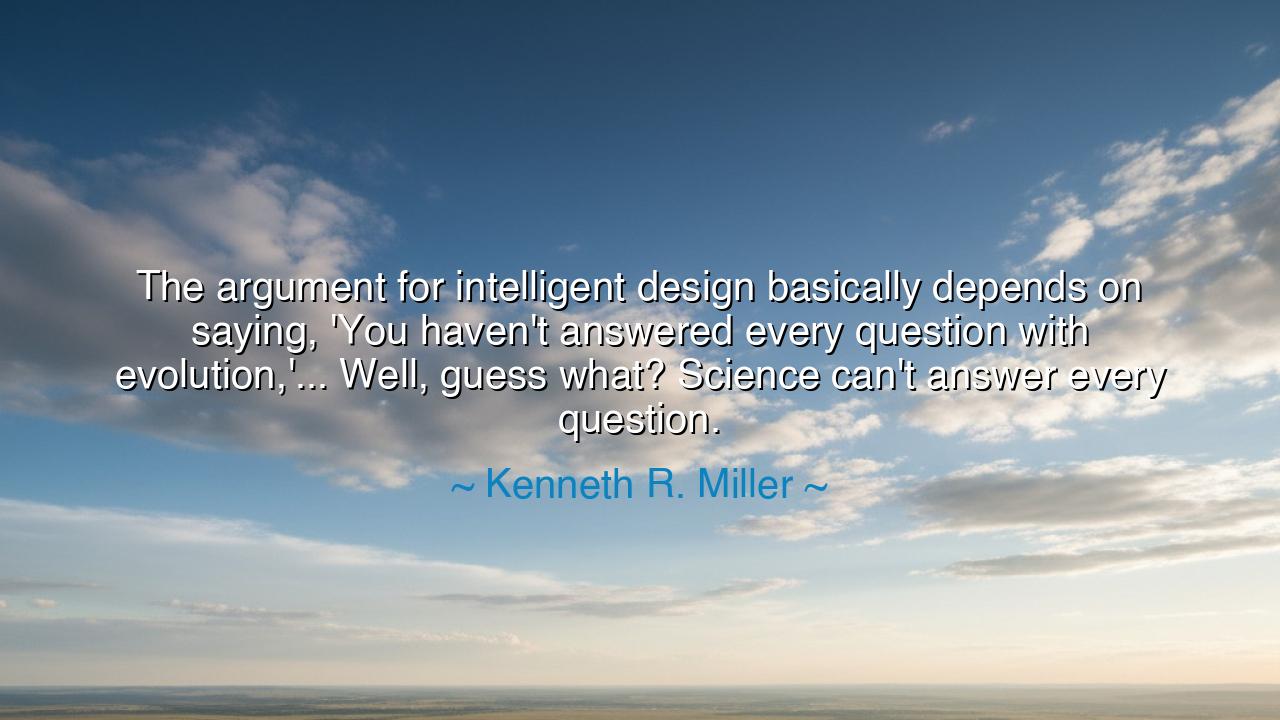
The argument for intelligent design basically depends on saying
The argument for intelligent design basically depends on saying, 'You haven't answered every question with evolution,'... Well, guess what? Science can't answer every question.






“The argument for intelligent design basically depends on saying, ‘You haven’t answered every question with evolution,’... Well, guess what? Science can’t answer every question.” — Kenneth R. Miller
Thus spoke Kenneth R. Miller, a man of science and faith, who sought not to divide the worlds of belief and reason but to bring them into harmony. In these words, he reveals a truth that humankind has wrestled with since the dawn of inquiry — that knowledge is not omniscience, and that the humility of science is its greatest strength. Miller, a biologist and professor, uttered this phrase amid the great debate over evolution and intelligent design, yet his insight reaches far beyond biology. It speaks to the heart of what it means to seek truth: to walk the path of discovery knowing that there will always be mysteries beyond our reach.
When Miller says, “Science can’t answer every question,” he does not diminish its power — he exalts its honesty. Science is not the voice of finality, but the melody of curiosity. It thrives not on the arrogance of knowing all things, but on the wonder of knowing some things truly. To those who invoke intelligent design — the notion that life’s complexity must be the work of a higher architect — Miller responds not with dismissal but with reasoned reverence: science does not claim to fill every void in understanding, only to illuminate what it can, and to accept the rest as the frontier of future discovery. His is a call to humility, a reminder that to admit uncertainty is not weakness, but wisdom.
The origin of this quote lies in the late twentieth and early twenty-first centuries, when the clash between Darwin’s theory of evolution and the advocates of intelligent design rekindled an ancient conflict between faith and reason. Miller, himself a devout Catholic, stood as a bridge between the two realms. He believed that evolution revealed the grandeur of creation, not its negation. To him, the natural world was not chaotic, but elegant — a testament to a universe where divine order and natural law coexist. His defense of science was not a denial of spirit, but an affirmation that truth, however found, must stand upon evidence.
This tension between the known and the unknowable has echoed throughout history. Consider Galileo Galilei, who turned his telescope to the heavens and saw moons orbiting Jupiter — proof that not all things revolved around the Earth. For this, he was condemned, not because he was wrong, but because he dared to say that human understanding was incomplete. The guardians of dogma feared the uncertainty that science revealed. Yet, like Miller centuries later, Galileo’s humility before truth became his strength. “I do not feel obliged to believe,” he said, “that the same God who has endowed us with sense, reason, and intellect has intended us to forgo their use.” Both men shared this conviction: that faith without reason becomes tyranny, and reason without wonder becomes emptiness.
Miller’s words also unveil a deeper philosophical truth — that mystery itself is sacred. Science, in its finest form, does not seek to erase mystery but to refine it. Every question answered births a dozen more, and in that endless unfolding lies humanity’s true grandeur. The argument of intelligent design falters not because it invokes the divine, but because it mistakes mystery for proof. To say “I do not yet understand” is not to say “it cannot be known.” Science moves forward precisely because it admits ignorance and transforms it into discovery. It is the eternal fire Prometheus stole — not to replace the gods, but to light the darkness with human understanding.
And yet, Miller’s insight applies not only to science, but to life itself. There are questions that reason cannot answer — questions of meaning, of purpose, of love and loss. These are not failures of intellect but the boundaries of our humanity. To accept them with grace is to live wisely. Just as science does not explain every mystery of the universe, so too must we learn that life will not answer every longing of the heart. But to keep questioning, to keep seeking, to hold faith and inquiry in balance — that is the mark of the enlightened soul.
So, my children, take heed of Kenneth R. Miller’s wisdom: do not fear what you do not yet know. Rejoice in it. For it is the unknown that summons the explorer, the artist, the philosopher, and the saint. Science cannot answer every question, but neither can silence or superstition. The purpose of inquiry is not to end wonder, but to deepen it. Hold fast to faith, but let it breathe in the light of reason. Ask boldly, seek patiently, and live humbly, for knowledge is the river that flows toward truth — and the moment we think it has ended, we have only reached a bend in its eternal course.
And thus, in the voice of Kenneth R. Miller, we hear the wisdom of ages: that truth is not possession but pilgrimage — a journey where every question is sacred, and every mystery, an invitation to grow closer to both the universe and the divine.






AAdministratorAdministrator
Welcome, honored guests. Please leave a comment, we will respond soon